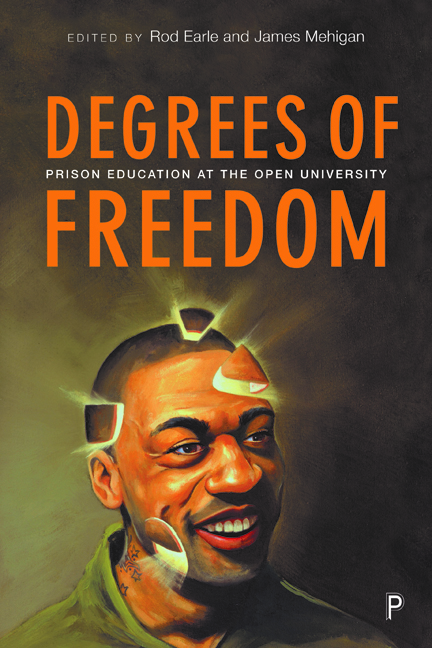Book contents
- Frontmatter
- Dedication
- Contents
- Notes on Contributors
- Acknowledgements
- 1 Openings and Introductions: Education for the Many, Prison for the Few
- 2 From Prisoner to Student
- Vignette 1 Choosing My Journey
- 3 Pioneers and Politics: Open University Journeys in Long Kesh During the Years of Conflict 1972–75
- Vignette 2 Avoiding the Mind-Numbing Vortex of Drivel …
- 4 A University Without Walls
- Vignette 3 Starting a New Chapter
- 5 Open Universities, Close Prisons: Critical Arguments for the Future
- Vignette 4 Out of the Abysmal
- 6 The Light to Fight the Shadows: On Education as Liberation
- 7 From Despair to Hope
- Vignette 5 Making my Commitment
- 8 Straight Up! From HMP to PhD
- 9 From Open University in Prison to Convict Criminology Upon Release: Mind the Gap
- Vignette 6 Message to a Prisoner
- 10 From the School of Hard Knocks to the University of Hard Locks
- 11 Becoming me with The Open University
- Vignette 7 Catching up with Kafka
- 12 From D102 to Paulo Freire: An Irish Journey
- Vignette 8 My Journey, My New Life
- 13 Ex-Prisoners and the Transformative Power of Higher Education
- Vignette 9 Prison Choices: Taking a Degree or Packing Tea?
- 14 What the OU did for me
- Appendix Study with The Open University
- Index
Vignette 7 - Catching up with Kafka
Published online by Cambridge University Press: 11 March 2021
- Frontmatter
- Dedication
- Contents
- Notes on Contributors
- Acknowledgements
- 1 Openings and Introductions: Education for the Many, Prison for the Few
- 2 From Prisoner to Student
- Vignette 1 Choosing My Journey
- 3 Pioneers and Politics: Open University Journeys in Long Kesh During the Years of Conflict 1972–75
- Vignette 2 Avoiding the Mind-Numbing Vortex of Drivel …
- 4 A University Without Walls
- Vignette 3 Starting a New Chapter
- 5 Open Universities, Close Prisons: Critical Arguments for the Future
- Vignette 4 Out of the Abysmal
- 6 The Light to Fight the Shadows: On Education as Liberation
- 7 From Despair to Hope
- Vignette 5 Making my Commitment
- 8 Straight Up! From HMP to PhD
- 9 From Open University in Prison to Convict Criminology Upon Release: Mind the Gap
- Vignette 6 Message to a Prisoner
- 10 From the School of Hard Knocks to the University of Hard Locks
- 11 Becoming me with The Open University
- Vignette 7 Catching up with Kafka
- 12 From D102 to Paulo Freire: An Irish Journey
- Vignette 8 My Journey, My New Life
- 13 Ex-Prisoners and the Transformative Power of Higher Education
- Vignette 9 Prison Choices: Taking a Degree or Packing Tea?
- 14 What the OU did for me
- Appendix Study with The Open University
- Index
Summary
Prison is like a microcosm of technocratic totalitarianism where every action collapses under the weight of its own bureaucracy. This often requires a member of senior management to override the rules in order to get things done! If you don't have a powerful backer, it's not happening. Most actions, from asking for toilet paper to doing a prison magazine, become a Kafkaesque nightmare rivalling Franz Kafka's novels such as The trial, The castle and Metamorphosis. Things can become incredibly distorted, out of all proportion and it seems like you’ve just fought the Cold War until you give yourself a reality check and realise that all you’ve achieved is the ability to wipe your behind. As for doing a degree in prison, if what would be considered a simple task in mainstream society, I’m sure readers can appreciate the sense of achievement every Open University (OU) module provides prisoners with.
I really can't emphasise enough how little things in prison become magnified tenfold. Prisoners and staff alike dig their heels in and become entrenched. Simple things become more difficult in prison, such as computers. In some prisons I’ve been in, I have only been able to access a computer once a week. I study in my cell because it's one of the only places where I have a degree of control over my study space, although at times it can be like a night club just a matter of feet away from where I’m studying. There are four pool tables, a table tennis table and two public telephones right outside my cell door. Between the hours of 5 pm and 8.30 pm the night club is in full swing.
During the day is the best time to study, but the prison usually requires you to go through what has been deemed rehabilitation. It becomes like a surreal script for a badly written B movie, with everyone going through it in order to get out of their own personal nightmare. Even the worst actors in the world are able to pull the wool over the eyes of the forensic psychologists. It can be surreal, as an observer, to witness this, but then you realise they have built their careers on this and have so much invested in it that they don't want to face the reality that what they’re doing is a waste of time.
- Type
- Chapter
- Information
- Degrees of FreedomPrison Education at The Open University, pp. 177 - 178Publisher: Bristol University PressPrint publication year: 2019

